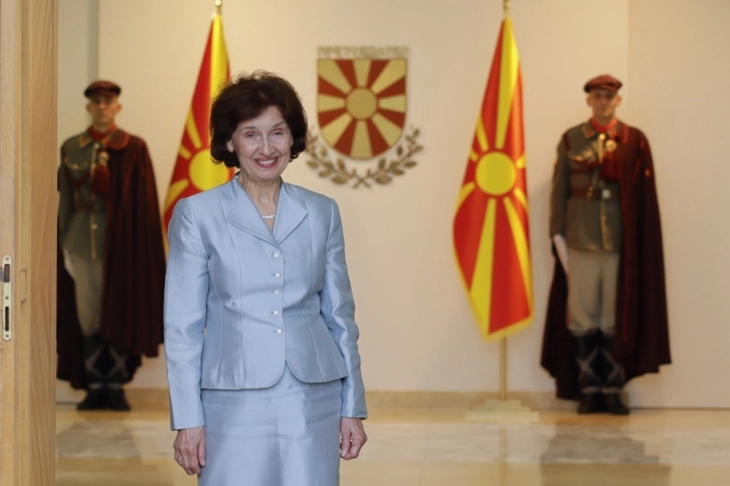President Gordana Siljanovska Davkova stated that she will respect the Prespa Agreement as a legal fact, even though she remains critical of its contents. She also expects the Greek side to demonstrate their respect for it as well.
Speaking at an event marking the 20th anniversary of the Center for Research and Policy Making (CRPM), Siljanovska Davkova responded to a journalist’s question on Monday, asserting that she has not violated the Prespa Agreement.
“I respect the Prespa Agreement – I don’t see that I’ve violated it. The agreement explicitly states that the name agreed upon will be used in documents and communication. So, I don’t see this as a violation. I neither tore up the statement nor said that I wouldn’t respect the Constitution, nor did I say I would terminate the Prespa Agreement. I criticized the agreement because of the procedure of its adoption and its inconsistency with the United Nations Charter. However, it is a legal fact and reality, and I will respect it,” Siljanovska Davkova said.
She emphasized her belief in the freedom of expression, self-identification, and self-determination, which she noted can be both collective and individual.
“For me, freedom of thought, as part of the Universal Declaration of Human Rights, the Convention for the Protection of Human Rights, and the EU Charter of Fundamental Rights, enables people to express themselves according to their own convictions. I don’t see that I’ve violated the Prespa Agreement,” stated President Siljanovska Davkova.
When asked whether this could affect the country’s EU prospects, she suggested that the question should be directed to the Greek side. Siljanovska Davkova pointed out that the country has amended its documents for internal use and referred to a provision of the Prespa Agreement stipulating that its implementation should occur five years after its entry into force and after the opening of the first EU accession chapter. She questioned whether any chapters have been opened and whether this constitutes a deviation from the Prespa Agreement.
“I can’t answer that, as Greek representatives would be better positioned to provide that information. Sometimes I hear warnings and threats, but international law dictates that agreements should be respected. However, when asking others to do something, it’s logical to question what we have done ourselves, using a logic of reciprocity. Anyone who has been to Greece can see that the name they ask us to respect is not emphasized anywhere. ‘Skopje’ remains prevalent, and even ‘Skopia’ is used, not to mention various acronyms and memorandums. For me, the most significant memorandum is the one concerning assistance in Euro-integrations. Therefore, I anticipate action by way of example. I also want to highlight that we have amended documents for internal use. The Prespa Agreement states that implementation should commence five years after its entry into force, and after the opening of the first chapter. I have a question for myself, for Greece, and for everyone else: have we opened any chapters, and isn’t that also an oversight, not to mention a violation? Isn’t that also a deviation from the Prespa Agreement?” President Siljanovska Davkova said.






Comments are closed for this post.